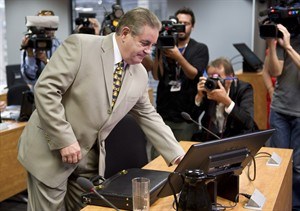
Former Montreal police chief Jacques Duchesneau arrives to testify before the Charbonneau Commission looking into corruption in Quebec's construction industry Wednesday, June 13, 2012 in Montreal. THE CANADIAN PRESS/Paul Chiasson
June 14, 2012 - 12:29 PM
MONTREAL - Quebec's corruption inquiry has heard its first incendiary testimony, with a prominent civil servant revealing himself as the man who leaked a document to the media about construction collusion because the government didn't care about it.
Jacques Duchesneau, a former federal official and Montreal police chief who most recently worked for the provincial goverment, said his political bosses clearly didn't care what he had to say.
He testified that when he tried last year to brief his supervisor, the transport minister, about the findings of his investigation into the construction industry, the minister was coldly indifferent.
He says then-transport minister Sam Hamad was staring out the window while he talked. He then says the minister refused to look at his report and that his assistants would deal with it.
"If I start talking to you and you look outside to see if it's nice outside, it affects concentration," Duchesneau told the corruption inquiry, for which he is the first star witness.
In his second day of testimony, Duchesneau said he hadn't heard from the minister for a year. He says he joked to Hamad: "If you lost my phone number, somebody could have given it to you."
So what did Duchesneau do? He leaked his report to the media.
He says he was convinced his report would be ignored — so he gave it to a reporter. As a result, it wasn't ignored at all. It caused a media sensation, and such intense political pressure that, after two years of relenting, Premier Jean Charest finally called a public inquiry.
The inquiry is now investigating corruption in the construction industry, and its ties to political parties and organized crime.
Duchesneau testified that those who didn't play by the rules set out by the group were often frozen out financially and even physically harmed.
Duchesneau says honest contractors were forced to respect the rules imposed by a select few he did not name. If contractors bid on a project when others told them not, they paid a price.
Duchesneau says there have been cases of entrepreneurs who have been physically threatened and beaten. Others were victims of "economic asphyxiation" or were suddenly unable to get insurance and money to complete jobs.
The former Montreal police chief and federal civil servant is testifying for a second day at a public inquiry into allegations of corruption in the construction industry.
Duchesneau says during his investigations he was able to identify 66 different strategies used to circumvent the formal rules, but adds there were likely more than 100 different schemes in total.
News from © The Canadian Press, 2012